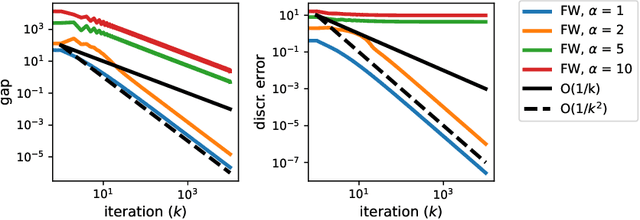Accelerating Frank-Wolfe via Averaging Step Directions
Paper and Code
May 24, 2022



The Frank-Wolfe method is a popular method in sparse constrained optimization, due to its fast per-iteration complexity. However, the tradeoff is that its worst case global convergence is comparatively slow, and importantly, is fundamentally slower than its flow rate--that is to say, the convergence rate is throttled by discretization error. In this work, we consider a modified Frank-Wolfe where the step direction is a simple weighted average of past oracle calls. This method requires very little memory and computational overhead, and provably decays this discretization error term. Numerically, we show that this method improves the convergence rate over several problems, especially after the sparse manifold has been detected. Theoretically, we show the method has an overall global convergence rate of $O(1/k^p)$, where $0< p < 1$; after manifold identification, this rate speeds to $O(1/k^{3p/2})$. We also observe that the method achieves this accelerated rate from a very early stage, suggesting a promising mode of acceleration for this family of methods.
 Add to Chrome
Add to Chrome Add to Firefox
Add to Firefox Add to Edge
Add to Edge